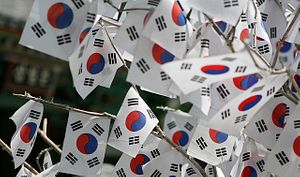Far be it from me to argue with Jesus. But doesn’t the prodigal son’s brother get a bum rap?
In the parable, the long-time bad guy, the younger brother, repents. Overjoyed dad orders a feast. Hang on, says elder bro. All these years I stayed home and did everything right – but you never threw me a party.
Well might South Koreans feel the same. For most global media, the Korea which gets all the attention is the other one: the bad guy. And Kim Jong-un hasn’t even repented: anything but!
The girl who cut my hair last week asked what I do. I told her, then asked what Korea means to her. Some weird place, causing trouble. She had no idea there were actually two of them.
Let’s hear it then for South Korea, for once. Especially today. My first regular column for The Diplomat is auspiciously timed. As all Koreans (if few others) know, August 15 – a holiday in both Koreas – is Liberation Day, when Japan surrendered in 1945 and Korea was free again.
Free – but also sundered by its U.S. and Soviet liberators. By chance, the same date also marks Asia’s other tragic post-colonial partition: in 1947 when the British Raj bloodily begat India and Pakistan. For peninsula and sub-continent alike, this is hardly a day for simple rejoicing.
Yet it’s a good day to celebrate South Korea, which is appropriate on two counts. First, South Koreans themselves tend toward pessimism. Some younger ones even complain their lives are hell.
Second, subsequent columns will no doubt include critical remarks on various specific issues. (Praise is boring, no?) Yet the ROK big picture remains by any standards immensely positive.
The facts should be well-known, but let’s reprise lest we forget. The Republic of Korea is one of today’s great success stories. From unpromising beginnings – post-1945 chaos and poverty, then back to square one in 1953 after three years of horrendous civil war – this remarkable country and people have accomplished so much and so widely, in all four fields that matter.
Economics first. In 1960 South Korea was poorer than much of Africa (and North Korea). By 2011, average incomes had surpassed the EU’s. Today’s ROK is an industrial powerhouse: the world’s 12th biggest economy and sixth largest exporter. That is an astonishing achievement.
True, this began as a forced march imposed by a tough dictator, Park Chung-hee. But South Korea long since transcended that. Its second triumph is political: 30 years of democracy, robust in all senses. The army is firmly back in the barracks: how many Asian countries can say that? Free and fair elections are held and honored, and impeachment has put Park’s daughter behind bars – on trial alongside the boss of Samsung, also in jail. These are no mean feats.
Tick social progress too, though many in Korea disagree. Yes, the welfare net is skimpier than most OECD member states. But education, healthcare and housing are good: ditto utilities and infrastructure. Dreary stuff, but vital to living well. Many nations fail or flail in these areas.
Last but not least is culture. The charms of K-pop are mostly lost on me. But everywhere else – wider music genres, cinema, literature, the visual arts – the picture is vivid and vibrant, as Korean artists reflect on how their country has changed and where it still needs to. Film apart, all this flowering of creativity and imagination remains too little known beyond the peninsula.
I first visited Seoul in 1982. It blew me away, and still does 35 years later. Neither uncritical – you’ll see – nor complacent, all I ask is that South Korea be judged, not against some Utopian ideal, but on two criteria: how far it has traveled, and how it compares to other countries.
On both counts, it surely gets an A grade. As today’s Koreans grapple with new problems – some, like a fast aging population, the result of success – let’s not underrate what has already been achieved. If this be hell, well: many elsewhere in Asia yearn to burn in the same flames.
Moreover, all this has been accomplished under constant threat from Pyongyang. Kim Il-sung chose from the start to build Sparta rather than Athens. Three generations of Koreans unlucky enough to live north of the 38th Parallel (since 1953, the DMZ) have paid a dreadful price.
Now Kim’s grandson is ramping up the war talk, bizarrely echoed by a U.S. president unlike any before, whose reckless rhetoric seems ready to risk all that six decades of U.S. deterrence have done to keep the peninsula at peace. As the tempest rages – hopefully just one more war of words – I wish all Koreans heartfelt Liberation Day greetings. Here’s to the next 72 years!

































